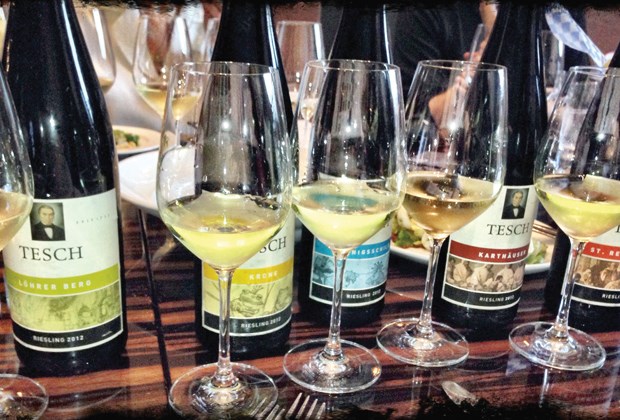It's not hard to like Martin Tesch or his wines, for that matter.
Besides, all he makes is Riesling. And he makes it very well.
Tesch is smart, witty and very engaging. But to really appreciate what he's achieved you need to understand a little bit about the German wine industry and how it has progressed in the last few years thanks in no small part to the likes of Tesch.
There was a time, not all that long ago, when it was all but illegal to mess with the hallowed laws of German wine labelling.
But Tesch did just that when he became involved with his father's estate, which you could say has been in the family for a few years, since 1723 to be precise. (Even that's relatively recent history. It was the Romans who first brought vines to the region of Nahe in what is now Germany.)
Tesch decided he wanted to focus on making just one style of wine: dry Riesling. He reduced the family's plantings by one third, removing the varieties in which he had no interest but leaving the Riesling old vines untouched, as well as some Pinot blanc (Weissburgunder) and Pinot noir (Spatburgunder).
"I am standing on the shoulders of my father, in terms of these wines," he says.
Then he went to work on the labels. Tesch really wanted to convey a simple message, so he renamed his principal wine Unplugged. In addition to conveying the notion of an unadulterated expression of the grape, the musical reference was deliberate and remains so. Tesch has no shortage of friends in the music business, including a number of high-profile bands.
He says his training as a biochemist came in handy.
"I did not know any rules as in what you should do or not do, so I couldn't break them on purpose," he says with a laugh.
Reaction to the re-naming ranged from outright shock to amusement.
"Although a lot of industry people just hated the package, the consumers loved it," says Tesch.Riesling Unplugged won rapid fame, and today they're pouring it by the glass at the Waldorf Astoria.
"As it turned out it was the best thing to do," says Tesch, who was also the first to introduce the Stelvin screw cap to Germany. And he wasn't finished.
Even though the winery's five single vineyard sites date from the middle ages, when the Bishop of Rheims ordained that Riesling would be grown, pronouncing names like Koningsschild, Lohrer Berg or St. Remigiusberg wasn't easy for everyone.
"Reading German wine labels is a black art," jokes Tesch.
He decided the simplest thing would be to colour code the labels by vineyard. If you are a Riesling lover, do yourself a favour and track down the vibrant, mineral-driven and quite spicy Karthauser 2012 (brown label), BCLS $27.99, 92 points.
"Some people couldn't handle it but it was a breakthrough."
Tesch says ultimately people want to know the name of the winery (and the vineyard), the varietal and the vintage.
The colours were all "stolen" from the London Underground map, he admits.
Belly's Best:
Tesch Riesling Unplugged 2012
Pure varietal expression: Zingy, mineral, green apple and citrus wrapped in juicy, vibrant acidity. Fresh shucked oysters and a splash of lemon. Nothing more, except sunshine, perhaps (BCLS $19.99, 90 points).
Tim Pawsey writes about wine for numerous publications and online as the Hired Belly at hiredbelly.com. Contact: [email protected].



